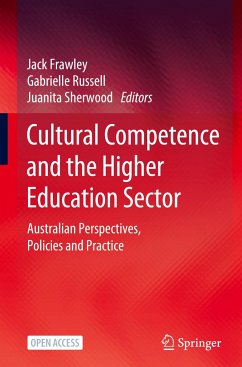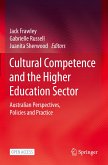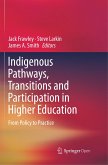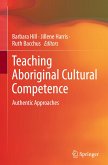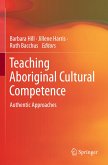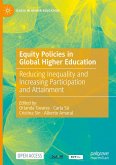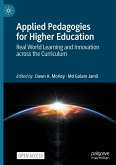Cultural Competence and the Higher Education Sector
Australian Perspectives, Policies and Practice
Herausgegeben:Frawley, Jack; Russell, Gabrielle; Sherwood, Juanita
Cultural Competence and the Higher Education Sector
Australian Perspectives, Policies and Practice
Herausgegeben:Frawley, Jack; Russell, Gabrielle; Sherwood, Juanita
- Gebundenes Buch
- Merkliste
- Auf die Merkliste
- Bewerten Bewerten
- Teilen
- Produkt teilen
- Produkterinnerung
- Produkterinnerung
This open access book explores cultural competence in the higher education sector from multi-disciplinary and inter-disciplinary perspectives. It addresses cultural competence in terms of leadership and the role of the higher education sector in cultural competence policy and practice. Drawing on lessons learned, current research and emerging evidence, the book examines various innovative approaches and strategies that incorporate Indigenous knowledge and practices into the development and implementation of cultural competence, and considers the most effective approaches for supporting…mehr
Andere Kunden interessierten sich auch für
![Cultural Competence and the Higher Education Sector Cultural Competence and the Higher Education Sector]() Cultural Competence and the Higher Education Sector31,99 €
Cultural Competence and the Higher Education Sector31,99 €![Indigenous Pathways, Transitions and Participation in Higher Education Indigenous Pathways, Transitions and Participation in Higher Education]() Indigenous Pathways, Transitions and Participation in Higher Education39,99 €
Indigenous Pathways, Transitions and Participation in Higher Education39,99 €![Teaching Aboriginal Cultural Competence Teaching Aboriginal Cultural Competence]() Teaching Aboriginal Cultural Competence77,99 €
Teaching Aboriginal Cultural Competence77,99 €![Teaching Aboriginal Cultural Competence Teaching Aboriginal Cultural Competence]() Teaching Aboriginal Cultural Competence77,99 €
Teaching Aboriginal Cultural Competence77,99 €![Equity Policies in Global Higher Education Equity Policies in Global Higher Education]() Equity Policies in Global Higher Education39,99 €
Equity Policies in Global Higher Education39,99 €![Applied Pedagogies for Higher Education Applied Pedagogies for Higher Education]() Applied Pedagogies for Higher Education39,99 €
Applied Pedagogies for Higher Education39,99 €![European Higher Education and the Internal Market European Higher Education and the Internal Market]() European Higher Education and the Internal Market93,99 €
European Higher Education and the Internal Market93,99 €-
-
-
This open access book explores cultural competence in the higher education sector from multi-disciplinary and inter-disciplinary perspectives. It addresses cultural competence in terms of leadership and the role of the higher education sector in cultural competence policy and practice. Drawing on lessons learned, current research and emerging evidence, the book examines various innovative approaches and strategies that incorporate Indigenous knowledge and practices into the development and implementation of cultural competence, and considers the most effective approaches for supporting cultural competence in the higher education sector. This book will appeal to researchers, scholars, policy-makers, practitioners and general readers interested in cultural competence policy and practice.
Produktdetails
- Produktdetails
- Verlag: Springer / Springer Nature Singapore / Springer, Berlin / University of Sydney
- Artikelnr. des Verlages: 978-981-15-5361-5
- 1st ed. 2020
- Seitenzahl: 384
- Erscheinungstermin: 10. Juni 2020
- Englisch
- Abmessung: 241mm x 160mm x 27mm
- Gewicht: 724g
- ISBN-13: 9789811553615
- ISBN-10: 9811553610
- Artikelnr.: 59218391
- Herstellerkennzeichnung Die Herstellerinformationen sind derzeit nicht verfügbar.
- Verlag: Springer / Springer Nature Singapore / Springer, Berlin / University of Sydney
- Artikelnr. des Verlages: 978-981-15-5361-5
- 1st ed. 2020
- Seitenzahl: 384
- Erscheinungstermin: 10. Juni 2020
- Englisch
- Abmessung: 241mm x 160mm x 27mm
- Gewicht: 724g
- ISBN-13: 9789811553615
- ISBN-10: 9811553610
- Artikelnr.: 59218391
- Herstellerkennzeichnung Die Herstellerinformationen sind derzeit nicht verfügbar.
Dr Jack Frawley is an Academic Leader at the University of Sydney's National Centre for Cultural Competence. Jack has held several senior academic positions at the Australian Catholic University, Charles Darwin University and the University of Sydney and is an Adjunct at the Bachelor Institute. His research and published work focus on social inclusion, especially in the area of leadership studies, program evaluation, teacher education, and minority education. He has worked extensively in Aboriginal Australia as well as the South Pacific and Southeast Asia Dr Gabrielle Russell is the Acting Director of the National Centre for Cultural Competence at the The University of Sydney. She has gained experience working in diverse non-government organisations, politics, business, church organisations and higher education. She is particularly interested in how to develop cultural competence from a non-Indigenous perspective and, in particular, how to facilitate a deeper understanding of transformative ways to learn and work together. Gabrielle's teaching and research interests include race and racism, critical pedagogies, service learning and cultural competence. Professor Juanita Sherwood is a registered nurse, teacher, lecturer, researcher and manager and has some thirty years of experience in the field of Aboriginal and Torres Strait Islander health and education. Through her lived experience, personal study and working history, Juanita has developed a strong cultural framework, which enables her to effectively present her knowledge in the context of education, history, culture, health and social justice. Her research focuses on Indigenous health, education, and social justice, Indigenous pedagogy, Indigenous research methodologies, Indigenous ethics and, perhaps more importantly, cultural competence.
Part I Introduction.- 1 Cultural Competence and the Higher Education Sector: A journey in the academy.- Part II Perspectives.- 2 The "Culture" in Cultural Competence.- 3 Reflecting on a Way of Being: Anchor principles of cultural competence.- 4 Locating Human Rights in the Cultural Competence Context.- 5 On the Critical, Morally Driven, Self-Reflective Agents of Change and Transformation: A literature review on culturally competent leadership in higher education.- 6 Beliefs, Events and Values Inventory Assessment of Global Identity: Implications and applications for international, cross-cultural and transformative learning.- Part III Policy and Policy Issues.- 7 Evaluating Cultural Competence in Indigenous Higher Education Contexts in Australia: A challenge for change.- 8 Indigenist Leadership in Academia: Towards an aspirational model of mindful servant leadership.- 9 Racism a Social Determinant of Indigenous Health: Yarning about cultural safety and cultural competence strategies toimprove indigenous health.- 10 Healing Mainstream Health: Building understanding and respect for indigenous knowledges.- 11 History in the Now: Asserting indigenous difference in "Top End" higher education using culturally responsive pedagogy.- Part IV Practice and Programs.- 12 The Sydney Language on our Campuses and in our Curriculum.- 13 Students and Academics Working in Partnership to Embed Cultural Competence as a Graduate Quality.- 14 Embedding Cultural Competence in Science Curricula.- 15 Embedding Cultural Competence in Faculty: A mixed-methods evaluation of an applied indigenous proficiency workshop.- 16 An Indigenous Australian Cultural Competence Course: Talking culture, race and power.- 17 "Learning Through Reflection" - Enhancing culturally proficient learning communities in midwifery practice and education: An experience-based learning journey in London, United Kingdom.- Part V Conclusion.- 19 Future Directions: Cultural competence and the higher education sector.
Part I Introduction.- 1 Cultural Competence and the Higher Education Sector: A journey in the academy.- Part II Perspectives.- 2 The "Culture" in Cultural Competence.- 3 Reflecting on a Way of Being: Anchor principles of cultural competence.- 4 Locating Human Rights in the Cultural Competence Context.- 5 On the Critical, Morally Driven, Self-Reflective Agents of Change and Transformation: A literature review on culturally competent leadership in higher education.- 6 Beliefs, Events and Values Inventory Assessment of Global Identity: Implications and applications for international, cross-cultural and transformative learning.- Part III Policy and Policy Issues.- 7 Evaluating Cultural Competence in Indigenous Higher Education Contexts in Australia: A challenge for change.- 8 Indigenist Leadership in Academia: Towards an aspirational model of mindful servant leadership.- 9 Racism a Social Determinant of Indigenous Health: Yarning about cultural safety and cultural competence strategies toimprove indigenous health.- 10 Healing Mainstream Health: Building understanding and respect for indigenous knowledges.- 11 History in the Now: Asserting indigenous difference in "Top End" higher education using culturally responsive pedagogy.- Part IV Practice and Programs.- 12 The Sydney Language on our Campuses and in our Curriculum.- 13 Students and Academics Working in Partnership to Embed Cultural Competence as a Graduate Quality.- 14 Embedding Cultural Competence in Science Curricula.- 15 Embedding Cultural Competence in Faculty: A mixed-methods evaluation of an applied indigenous proficiency workshop.- 16 An Indigenous Australian Cultural Competence Course: Talking culture, race and power.- 17 "Learning Through Reflection" - Enhancing culturally proficient learning communities in midwifery practice and education: An experience-based learning journey in London, United Kingdom.- Part V Conclusion.- 19 Future Directions: Cultural competence and the higher education sector.

